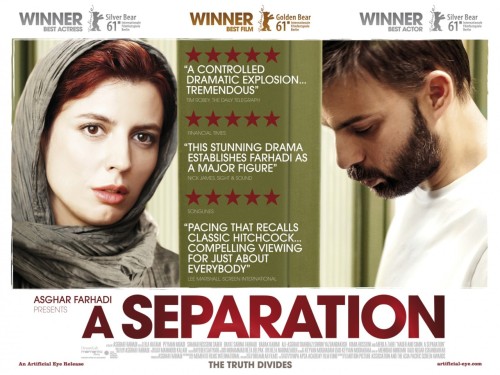
I got the opportunity to watch The Artist at the New York Film Festival, but never got the opportunity to write about it. It's a film of some lightness but it's incredibly lovely; the film draws you into its concept soon enough and, in spite of occasionally dipping into the more melodramatic and maudlin near the climax of the film, the very end goes off on a booming and spirit lifting note that has a full theater cheering at the end. I saw it among cinephiles and average moviegoers alike and the opinions were pretty much the same, and judging from the critical reaction it looks like it ticks off boxes for all relevant camps.
As far as the Oscar race goes, there appear to be three films that can conceivably win the top prize at this point — Alexander Payne's Clooney led The Descendants, Spielberg's War Horse and this. Sure, Michel Hazanavicius doesn't quite have the starpower of Spielberg's name nor does lead actor Jean Dujardin carry the crowd recognition of George Clooney. That said, anytime Dujardin's glowing smile isn't on screen, you wish it was. And we see last year with Tom Hooper beating someone at career peak like David Fincher last year that directorial star power doesn't quite go all the way every time. At this point, War Horse is more of a wildcard than anything. Spielberg this year has gotten off to a fine note getting a decent reaction for The Adventures of Tin Tin which was seen as being a lot riskier in reception than the film based upon the most recent Tony winner for Best Play.
The problem with Payne is that his films don't really hold up. Sideways positively swept the critics awards in 2004 and he may find similar passion among them this year, but in the general populace his films don't exactly hold up. Sideways loses impact upon repeated viewings while something like About Schmidt or Election are praised for little else than their respective central performances. Payne also had won an Oscar for the screenplay for Sideways and does seem to be perceived as more of a writer than a director, and George Clooney had been given his own Oscar not even that long ago while going up against Oscarless actors of similar star status like Leonardo DiCaprio and Brad Pitt. Most damning for the film is the fact that, as far as the distinction vis à vis The Artist goes is that people like The Descendants...people love The Artist.
This much was evidenced by its audience win at the Hamptons Film Festival, among a few other places, since Hamptons is where many Academy members can be found trying to catch up on this year's crop of films. You might remember last year, another Harvey Weinstein vehicle, The King's Speech took that prize. The Artist missed out on the Toronto audience award that jumpstarted The King's Speech's campaign, but it has more going for it than The King's Speech, that being that it simply fits better within the framework of the more recent winners. Whether its win was balked or not by the majority of cinephilic communities, The King's Speech still may well have been the third best reviewed film nominated last year behind The Social Network and Toy Story 3, and Colin Firth had still managed to take 2 out of 3 of the central critics groups' awards; The Artist will likely inspire even more critical adulation. It has that distinguishable feature that almost certainly makes it stand out, being silent and black and white, that reminds me of Slumdog Millionaire's ascent into Best Picturedom. And while the more dramatic elements of the story remind older voters of the most traditionally pleasurable of Hollywood themes and entertainment, the story of a Hollywood star transitioning to major changes in the film industry could not be better timed with the onset of actors' fears of motion capture performance and 3D sales dominating the new industry business model. Read more!



